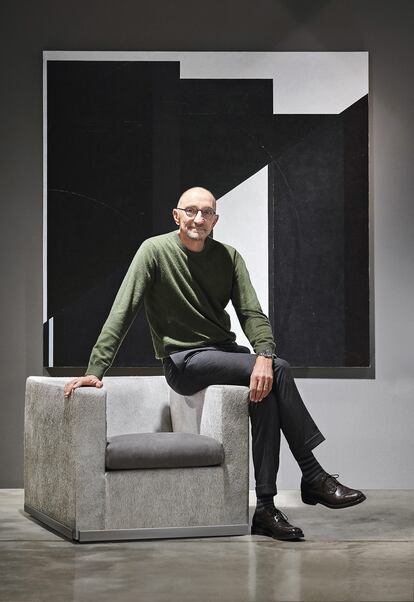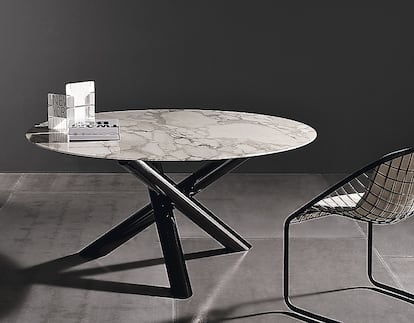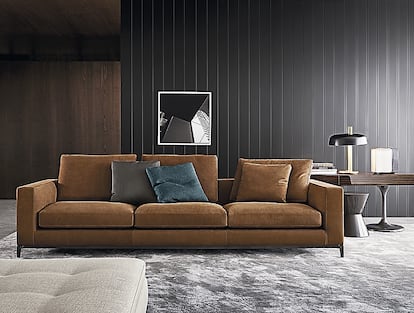The legacy of Rodolfo Dordoni, the designer who cultivated the luxury of common sense: ‘A pretty shape is not enough’
A few months ago one of the most influential designers of the century passed away. The artistic director of Minotti always knew that his designs sold well because it was what the public needed

The designer Rodolfo Dordoni, who died last August at the age of 69, was always clear about the coordinates of his profession. “Rational, very rational. Yet rational does not mean inflexible but logical. Use your brain. Be consistent. Designing is a job: connecting production and the market.” With these words, Dordoni had defined in an interview with this newspaper in 2020 the personal style that had led him to conquer an enviable position: artistic director of Minotti, a flagship of high-end Italian furniture.
Born in Milan, Dordoni began his cursus honorum in an orthodox way, at the School of Architecture of the Milan Polytechnic, which is the university that has produced several generations of designers because, not in vain, it was there that the notion of design that continues to prevail in Italy was born: a mixture of playful spirit and practical vocation, of engineering and poetry, of art and sociology. Dordoni, who in person was a man who took the stardom away from the stardom in which many of his fellow professionals lived, understood his profession from a sensible point of view. He was commercial in the good sense of the word: his designs sold because that was what the public needed.
He began working with Minotti in 1997, and a year later he assumed the artistic direction and coordination of its collections. In the world of furniture, this position is anything but decorative: it consists of supervising all designs, the in-house ones and those of others, to introduce them into the house’s own style, and also ensuring their long-term survival: his tasks ranged from redesigning a sofa that already existed to making it more sustainable or coordinating the renovation of the brand’s own stores or designing the company’s offices. Dordoni did all this during a quarter of a century in which Minotti, one of the legends of Italian design, was able to adapt to new times and new audiences. Meanwhile, he found the time to create his own studio, Dordoni Architects (with Alessandro Acerbi and Luca Zaniboni), from where he helped lay the foundations of what is now called international luxury: calm, practical and friendly, but also rigorous and full of exquisite details.


His designs keep his legacy alive following his death, especially his sofas, the specialty of Minotti and, over the years, also of Dordoni. “Minotti was a university, I learned a lot,” he recalled in the same interview. “Even today, when I work for other companies, I notice it. I like to undertake projects with depth, and I suffer if I perceive that it is taken lightly. It’s not what I’ve learned.”
Over the years, he created best-selling models such as the Andersen sofa, a refined and ultra-ergonomic variation, without losing the geometry of the traditional elevated sofa. Or the Yang model, which eschewed continuity and proposed an alternation of volumes and spaces that made it seem allergic to boredom. They are subtle but effective designs, which require seeing beyond the gray that, for designers in the sector, is like black for the great couturiers: a litmus test, a way to check if an idea really works. “I have learned that a pretty shape is not enough,” he declared in 2020. “That the image is not enough, the important thing is what you don’t see. That’s what I mean when I talk about quality.”
Generous with the press, he was always accessible and polite even in the hustle and bustle of the Salone del Mobile trade show. In recent years he had multiplied his creative activity and signed recent and instant classics such as Roger and Dylan, two sofas that, through their rigorous and technological voluptuousness, represent a synthesis of the virtuosity to which today’s design aspires. Call it commercial flair. Or, perhaps, a singular form of humanism.
Sign up for our weekly newsletter to get more English-language news coverage from EL PAÍS USA Edition
Tu suscripción se está usando en otro dispositivo
¿Quieres añadir otro usuario a tu suscripción?
Si continúas leyendo en este dispositivo, no se podrá leer en el otro.
FlechaTu suscripción se está usando en otro dispositivo y solo puedes acceder a EL PAÍS desde un dispositivo a la vez.
Si quieres compartir tu cuenta, cambia tu suscripción a la modalidad Premium, así podrás añadir otro usuario. Cada uno accederá con su propia cuenta de email, lo que os permitirá personalizar vuestra experiencia en EL PAÍS.
¿Tienes una suscripción de empresa? Accede aquí para contratar más cuentas.
En el caso de no saber quién está usando tu cuenta, te recomendamos cambiar tu contraseña aquí.
Si decides continuar compartiendo tu cuenta, este mensaje se mostrará en tu dispositivo y en el de la otra persona que está usando tu cuenta de forma indefinida, afectando a tu experiencia de lectura. Puedes consultar aquí los términos y condiciones de la suscripción digital.









































